I have a program shown as follows. For it I have several questions:
1). Why does it produce different results on different platforms? I'll paste the screen-shots later.
2). I'm using a fail() method to check if the "file.read()" failed. Is this correct? I use fail() method because this web page says this:
The function returns true if either the failbit or the badbit is set. At least one of these flags is set when some error other than reaching the End-Of-File occurs during an input operation.
But later I read this page about istream::read() here. It says the eofbit and failbit would always be set at the same time.. Does this mean that a normal EOF situation would also result in that fail() returns true? This seems to conflict with "other than reaching the End-Of-File occurs"..
Could anyone help me clarify how I am supposed to use these methods? Should I use bad() instead?
My program
#include <iostream>
#include <fstream>
using namespace std;
#ifdef WIN32
char * path="C:\\Workspace\\test_file.txt";
#else
char * path="/home/robin/Desktop/temp/test_file.txt";
#endif
int main(int argc, char * argv[])
{
ifstream file;
file.open(path);
if (file.fail())
{
cout << "File open failed!" << endl;
return -1; // If the file open fails, quit!
}
// Calculate the total length of the file so I can allocate a buffer
file.seekg(0, std::ios::end);
size_t fileLen = file.tellg();
cout << "File length: " << fileLen << endl;
file.seekg(0, std::ios::beg);
// Now allocate the buffer
char * fileBuf = new (std::nothrow) char[fileLen+1];
if (NULL == fileBuf)
return -1;
::memset((void *)fileBuf, 0, fileLen+1); // Zero the buffer
// Read the file into the buffer
file.read(fileBuf, fileLen);
cout << "eof: " << file.eof() << endl
<< "fail: " << file.fail() << endl
<< "bad: " << file.bad() << endl;
if (file.fail())
{
cout << "File read failed!" << endl;
delete [] fileBuf;
return -1;
}
// Close the file
file.close();
// Release the buffer
delete [] fileBuf;
return 0;
}
The test_file.txt content(shown with "vim -b". It's a very simple file):

Result on Windows(Visual Studio 2008 SP1):

Result on Linux(gcc 4.1.2):
